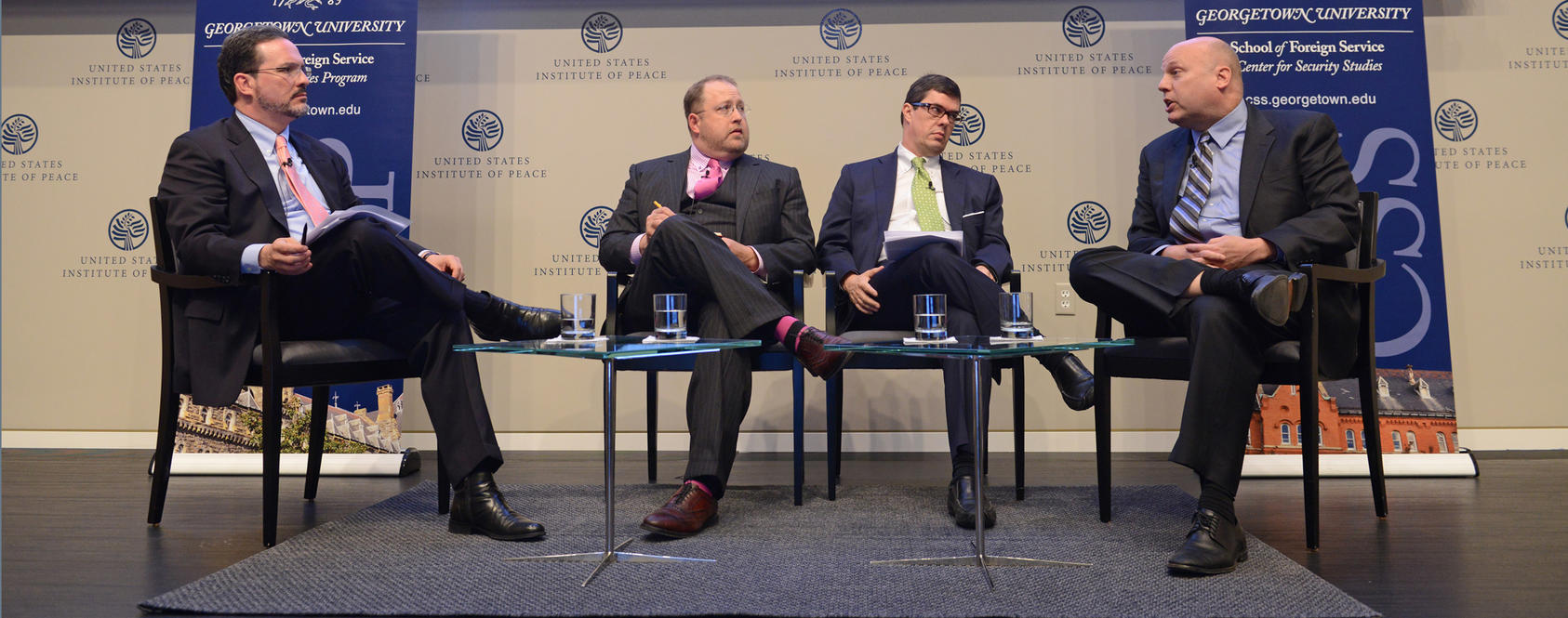China’s Roles in the World
The U.S. Institute of Peace and the Georgetown University's School of Foreign Service hosted "China’s Roles in the World," a daylong conference designed to explore China’s growing role in the global economic, military and political realms and implications for regional security and U.S. policy. This conference will provided a more comprehensive perspective of Chinese foreign policy by evaluating the various roles China plays in the world – as rule maker, rule breaker and partner.

There are a variety of characterizations of China that suggest the need to move beyond the conventional approach of evaluating China’s role in terms of areas of just competition or cooperation. From one perspective, China has increasingly contributed to the international order, joining many international and regional organizations. China has also served as a welcomed partner in dealing with a range of regional and transnational issues, by contributing to counter-piracy in the Gulf of Aden, and other humanitarian and peacekeeping operations. As a testament to its role as a partner, the People’s Liberation Army has held 28 joint exercises and 34 joint training sessions with 31 countries in accordance with relevant agreements or arrangements. There are questions about China's compliance with international law and custom in a number of critical areas, including intellectual property theft and provocative behavior in the maritime and air domains of the South and East China Seas.
The conversation was continued on Twitter with #RolesofChina, @USIP, and @GeorgetownCSS.
Explore Further
Panel One:
Panel Two:
Keynote Address:
Panel Three:
Panel Four:
Concluding Remarks:
8:30-9:30 AM: Registration
9:30-9:45 AM: Welcome
- George Lopez, Vice President of the Academy for International Confict Management and Peacebuilding, U.S. Institute of Peace (USIP)
- Thomas Banchoff, Vice Provost for Global Engagement, Georgetown University
9:45-10:45 AM: Panel One - How China Defines Itself
- Zheng Wang, Director, Center for Peace and Conflict Studies, Seton Hall University
- Andrew Scobell, Senior Political Scientist, RAND Corporation
- Zhu Feng, Professor, Institute of International & Strategic Studies, Peking University
- Chair: Oriana Skylar Mastro, Assistant Professor, Georgetown University
10:45-11:00 AM: Break
11:00-12:00 PM: Panel Two: China as Rule Maker
- Susan Lawrence, Specialist in Asian Affairs, Congressional Research Service (CRS)
- Robert Daly, Director, Kissinger Institute on China and the United States, Wilson Center
- Patrick M. Cronin, Senior Advisor and Senior Director of the Asia-Pacific Security Program, Center for a New American Security (CNAS)
- Chair: Thomas McNaugher, Senior Visiting Professor, Georgetown Center for Security Studies
12:00-12:15 PM: Break
12:15-1:15 PM: Lunchtime address on China and the Wider West
- Sir Peter Westmacott, British Ambassador to the United States
- Moderator: Michael Green, Associate Professor, Georgetown Asian Studies Program and Senior Vice President and Japan Chair, Center for Strategic and International Studies (CSIS)
1:15-1:30 PM: Break
1:30-2:30 PM: Panel Three: China as Rule Breaker
- James Mulvenon, Vice President, Defense Group, Inc (DGI)
- Tom Mahnken, Jerome Levy Chair of Economic Geography and National Security, U.S. Naval War College
- Derek Scissors, Resident Scholar, American Enterprise Institute (AEI)
- Chair: Michael Green, Associate Professor, Georgetown Asian Studies Program and Senior Vice President and Japan Chair, CSIS
2:30-2:45 PM: Break
2:45-3:45 PM: Panel Four: China as Partner
- Melanie Hart, Director for Chinese Energy and Climate Policy, Center for American Progress
- Taiya Smith, Principal Partner at Garnet Strategies, LLC
- Phillip C. Saunders, Director, Center for the Study of Chinese Military Affairs at National Defense University's Institute for National Strategic Studies
- Chair: Stephanie Kleine-Ahlbrandt, Director of Asia-Pacific Programs, USIP
3:45-4:15 PM: Concluding Remarks: U.S. Role in the Region
- Oriana Skylar Mastro, Assistant Professor, Georgetown University
- Stephanie Kleine-Ahlbrandt, Director of Asia-Pacific Programs, USIP
- David Maxwell, Associate Director, Georgetown Center for Security Studies



